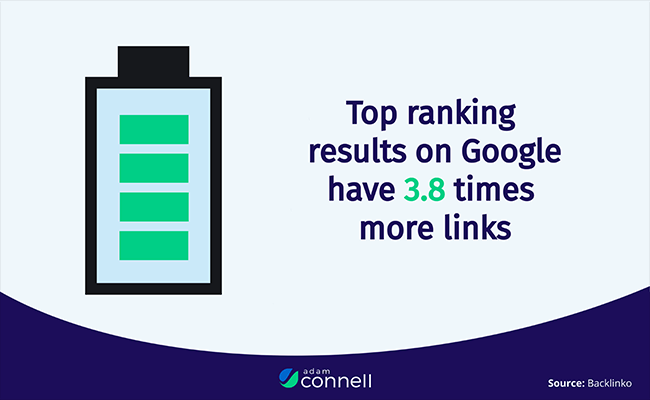98 Important SEO Statistics For 2024 (Market Share, Trends, And More)

Looking for SEO statistics to inform your SEO strategy? We’ve got you covered!
The Search Engine Optimization (SEO) landscape is constantly evolving. If you want to keep ranking and driving traffic through organic search, it’s important to stay up to date with the latest industry trends and best practices.
And for that, you need data.
In this roundup of SEO statistics, we’ll be exploring the current state of SEO and sharing data-driven insights about:
- The most important SEO ranking factors
- Emerging SEO trends and challenges
- The SaaS tools that dominate the SEO industry
- Industry benchmarks (CTRs, ROI, etc.)
- Link-building, voice search, and other important branches of SEO
- Plus lots more!
Editor’s top picks – SEO statistics
- Organic search accounts for 53.3% of all web traffic (BrightEdge1)
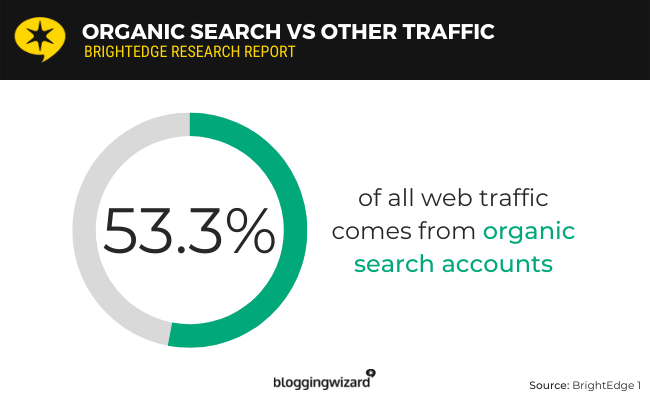
- SEO is the fourth most popular marketing channel. (HubSpot)
- 69% of companies invested in SEO last year. That’s up 5 percentage points from the year before. (HubSpot)
- 64.6% of SEO pros in 2021 said their results were more successful than the year before. (Search Engine Journal)
- SEO generates ROIs of up to 12.2x initial spend (Terakeet3)
- Google dominates the global search engine market, with over two-thirds of the market share (69.3%) (Startup Bonsai)
- The page that ranks in position one on the first page of the search results gets 32% of clicks. (Backlinko3)
- On-page elements were rated the most important ranking factor by 32.8% of SEO professionals (Search Engine Journal)
- Core Web Vitals was rated the most important emergent ranking factor by over 36% of SEO professionals (Search Engine Journal)
- The SEO software market is projected to reach $1.6 billion by 2027. (Research And Markets)
What are the benefits of SEO?
Let’s start by looking at the main benefits of SEO, as revealed in these SEO statistics:
- SEO can reduce customer acquisition costs by as much as 87.4% compared to traditional digital advertising. (Terakeet1)
- 70% of marketers think SEO is more effective at driving sales than PPC (Databox)
- SEO can increase monthly organic page views by as much as 11.3x in just under 2 years, according to one case study. (Terakeet2)
- 53% of consumers in the US report researching products on a search engine before making a purchase decision (Google1)
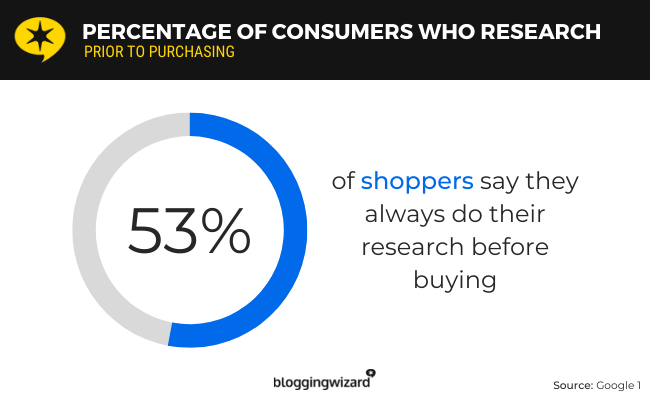
- 60% of marketers say SEO and other inbound strategies provide the best leads. (HubSpot2)
- 70% of ecommerce journeys begin in the SERPs (BrightEdge2)
And that’s not all. The insights you gather from SEO can also help with other areas of your digital marketing strategy. In fact:
- 78% of marketers say they use SEO insights to help with their content marketing efforts
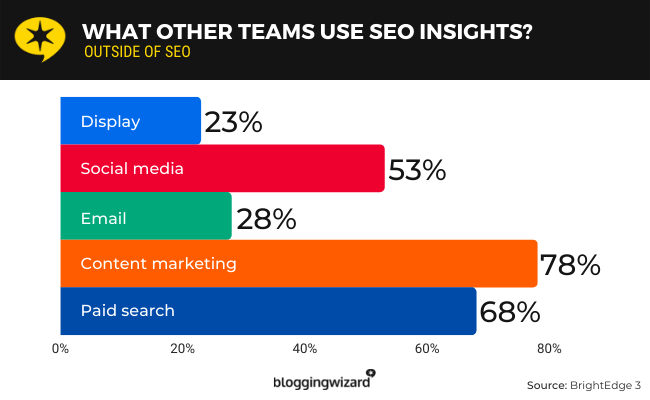
- 68% of marketers say SEO insights inform their paid search campaigns
- 53% say they apply SEO insights in their social media marketing efforts
(BrightEdge3)
What are the most popular search engines?
Here are the top 5 search engines in the world according to recent statistics:
- Unsurprisingly, Google is the most popular search engine by a large margin, with a market share of 69.3%.
- Bing is the second most popular search engine in the world, with a 13.85% market share
- Baidu is the third most popular search engine in the world with 12.78%. It’s also the most popular search engine in China, which accounts for most of its user base.
- Yahoo ranks fourth with just a 1.76% market share.
- Yandex ranks fifth with 1.19% of the global market share. However, it’s the most popular search engine in Russia, which is where most of its internet users are based.
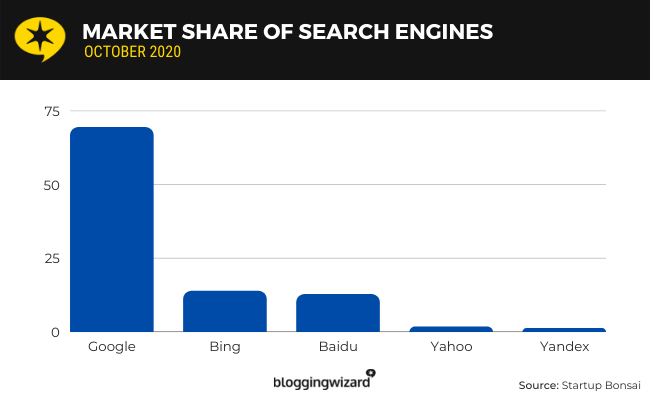
(Startup Bonsai)
What is the ROI of SEO?
Wondering what kind of returns to expect from your SEO efforts? Well, let’s start with the good news:
- Almost half (49%) of marketers say organic search has the best ROI of all marketing channels. (Search Engine Journal2)
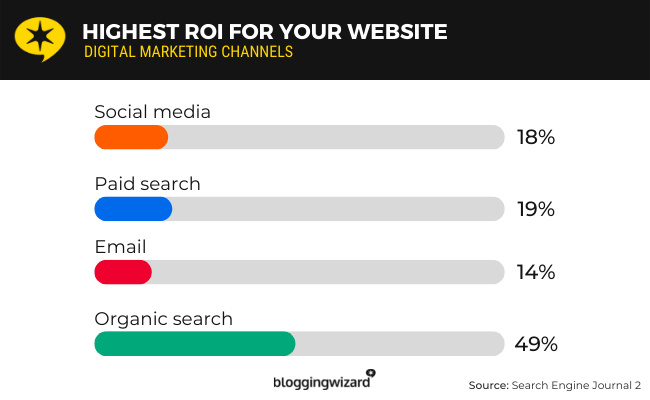
- A typical SEO ROI is somewhere between 5x and 12.2x marketing spend. This is according to case studies, but every company will have different results, so it’s tough to give an overall ‘average’ SEO ROI across the board. (Terakeet3)
The bad news is that SEO ROI is notoriously hard to measure. It takes a long time to see results from your SEO campaigns and it can be tough to put a monetary value on the increased search visibility it brings.
How do I measure SEO performance?
Here’s how most marketers in a recent survey measure their SEO performance:
- Keyword ranking position is the most commonly-used metric for measuring SEO performance. It was used by 43.9% of surveyed respondents.
- 32.8% of respondents look at page views to measure SEO performance, making it the second most popular metric.
- 20.7% measure Marketing Qualified Leads to analyze their SEO performance, making it the third most popular metric.
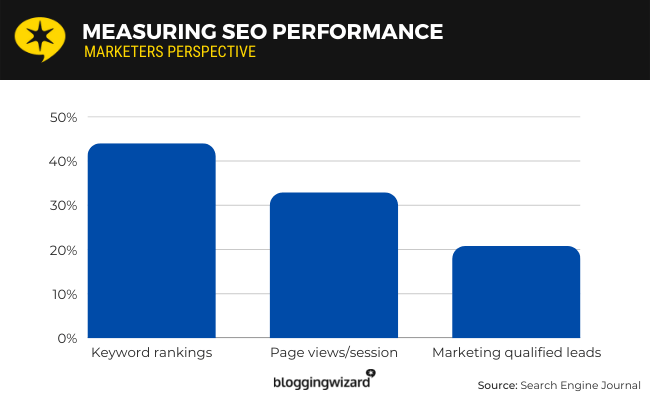
(Search Engine Journal)
Ranking statistics
Next, let’s take a look at some interesting SEO ranking statistics:
- 32% of all clicks go to the top-ranking result in Google. (Backlinko3)
- Almost 60% of pages that rank in the top 10 positions on Google are at least 3 years old (Ahrefs3)
- The Google algorithm looks at over 200 factors to determine ranking position (Backlinko4)
What are the top SEO ranking factors?
The statistics below highlight which ranking factors SEO pros think are the most important:
- 32.8% of SEO professionals think on-page elements are the most important ranking factors. That includes heading tags, meta descriptions, etc.
- 31% think organic user behaviors (e.g. bounce rate and time on site) are the most important ranking factors.
- 24.6% think content depth and accuracy have the biggest impact on ranking
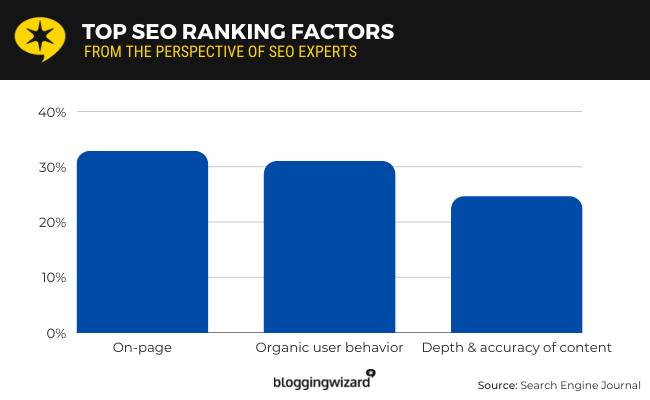
(Search Engine Journal)
Related: Check out our roundup of the best SEO rank tracking tools to monitor your keyword positions.
How will SEO change over the next few years?
Every time Google releases an update to its algorithm, ranking factors can shift. Here’s how marketers expect the SEO landscape to change in the near future:
- 36.7% of SEO professionals think Core Web Vitals will be the most important ranking factor over the coming years.
- 25.4% think structured data will be the most important emerging SEO factor in the next few years.
- 25% think that EAT and trusted sources will be the most important emergent factor
- 34.7% of SEO pros plan to focus on the user experience this year
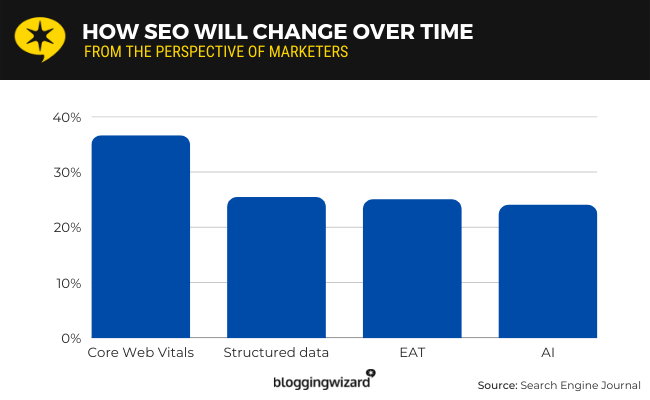
(Search Engine Journal)
What are the most popular SEO strategies?
Now let’s take a look at which SEO strategies surveyed marketers are focusing on, according to data from HubSpot:
- 75% of marketers rated their SEO tactics as ‘extremely’ or ‘very effective’.
- 71% of respondents said their company’s SEO tactic was to focus on strategic keywords
- 50% said their company was focusing on SEO localization.
- 48% said their company was focusing on optimizing for mobile.
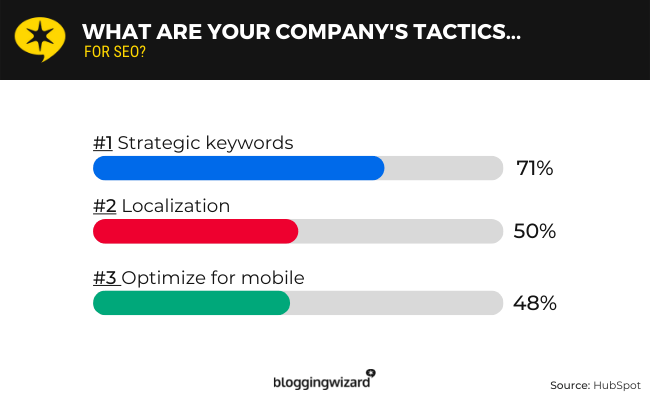
(HubSpot)
SEO statistics on keyword research
Keyword research is a big part of SEO. Here are some interesting keyword statistics that you might find useful:
- 36.3% of SEO professionals spend the majority of their time on keyword research. That’s more than any other SEO activity.
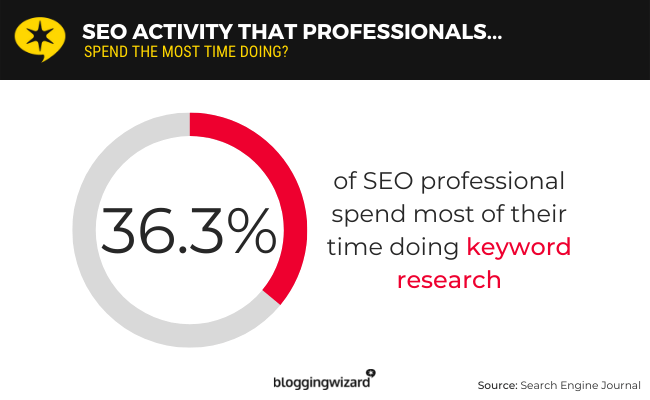
(Search Engine Journal)
- Over 92% of keywords get fewer than 10 searches per month
- Over 70% of keywords with 10,000+ searches per month are 1-2 words long
- Over 60% of all searches come from a tiny fraction (around 0.16%) of the most popular keywords
(Ahrefs4)
- Question keywords make up around 8% of search queries.
(Moz)
Related: Discover high volume, low-competition keywords with these keyword research tools!
SEO statistics on challenges
What are the biggest challenges SEO marketers face? Here’s what the stats tell us:
- 38.7% of marketers think zero-click SERPs are the biggest threat facing SEO.
- 35.1% think Google updates are the biggest threat
- 28.4% think machine learning and AI are the biggest threat
(Search Engine Journal)
- 65% of SEO professionals spend 4-6 hours per day on research activities, suggesting SEO is very time-consuming.
(BrightEdge3)
SEO marketer salary statistics
Wondering how much SEO professionals earn? Here’s what you need to know.
- More SEO professionals earn between $50,000 to $74,000 than any other salary bracket
- Only 3.1% of SEO professionals earn over $200,000
- 17% of SEOs who earn over $200,000 have 20+ years of experience
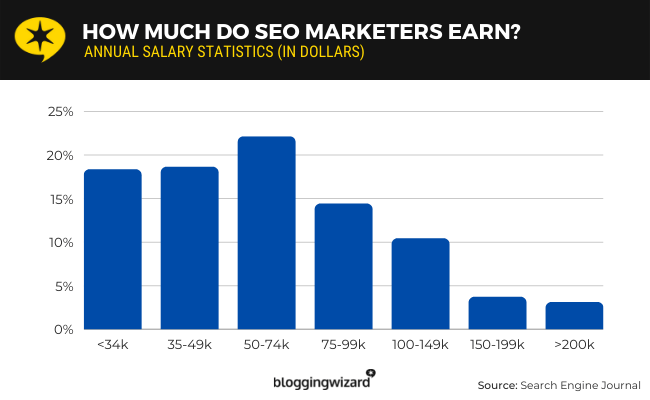
(Search Engine Journal)
Video SEO statistics
When marketers think of SEO, they often think of Google. But in reality, SEO applies to all search platforms, including video platforms like YouTube.
Here are some interesting SEO statistics about YouTube and videos:
- YouTube is the most-visited video search platform (and the second-most visited website) in the world with over 35 billion monthly visits (Similarweb)
- Engagement metrics (comments, shares, likes, views) correlate strongly with YouTube ranking positions. (Backlinko5)
- Posts that include videos generate 157% more search traffic and earn more backlinks. (Search Engine People)
Local SEO statistics
If you’re running a local business, you might find these local SEO statistics useful:
- 46% of all Google searches are for local businesses (Search Engine Roundtable)
- 76% of people who search for something nearby on a smartphone will end up visiting within a day. (Google2)
- Yelp ranks in the top five Google search results for 92% of searches that include a city and business category.
- Businesses that have at least 4 stars on Google Business (GB) outrank those that don’t by 11% on average.
(Fresh Chalk)
SEO software market size
How big is the global SEO software market? Let’s find out.
- The global SEO software market was estimated at $626.5 million USD as of 2020.
- It’s projected to grow at a CAGR of 14.4% over the next few years and to reach $1.6 billion USD by 2027.
(Research And Markets)
According to Statista’s study of the leading B2B SEO SaaS companies:
- Semrush is the leading software provider by revenue, with annual recurring revenue of 125 million USD.
- Scorpion came second place with annual recurring revenue of 106 million USD
- Moz came third with recurring revenue of 61 million USD.
(Statista)
Most popular SEO software
The software providers above may be the market leaders by revenue, but which are the most popular tools used by marketers?
Here’s what data from HubSpot would suggest:
- 72% of companies use Google Analytics, making it the most commonly-used SEO tool
- 49% use Google Search Console, making it the second most popular SEO software tool
- 36% use Google Keyword Planner, landing it in third place.
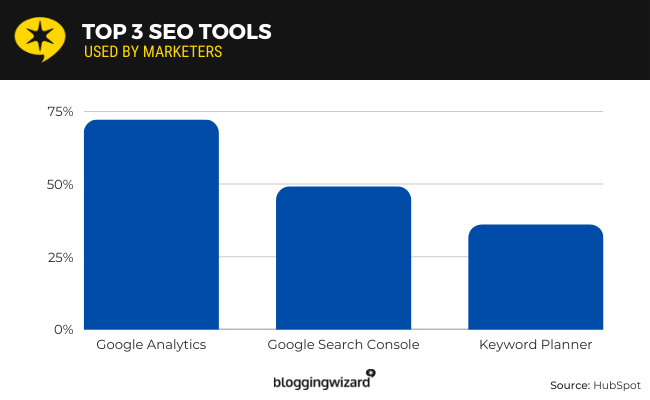
(HubSpot)
- 60% of marketers use 4-6 different tools for SEO.
(BrightEdge3)
SEO statistics on link building
Link building and off-page SEO has long been seen as an essential part of the SEO jigsaw. But is it still as effective as it used to be at boosting authority and improving ranking positions?
Here’s what marketers think:
- When asked how effective link building is in influencing organic search rankings, marketers ranked it 7.8/10 on average.
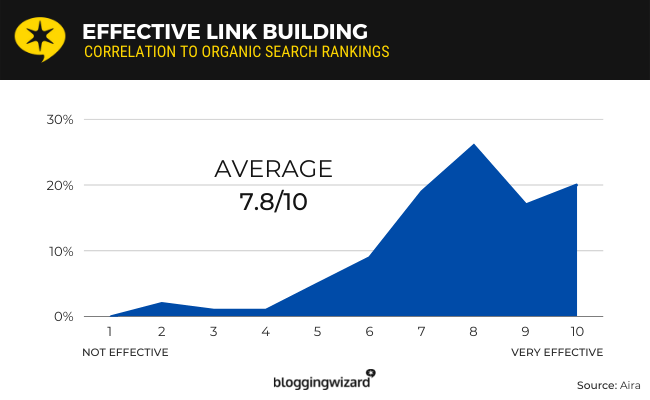
- 94% of marketers think backlinks will still be a Google ranking factor in 5 years’ time.
- 99% of marketers think link building positively influences rankings at least some of the time.
(Aira)
How many backlinks do I need to rank?
There’s no hard-and-fast rule about the number of backlinks needed to rank. It all depends on the keywords you’re targeting and how competitive they are. But here are some backlink SEO statistics that might help to give you a better idea of what to aim for:
- Pages that rank in position one have 3.8x more backlinks than those in positions 2-10.
- Top-ranking pages have somewhere between 10 and 100 backlinks, on average.
(Backlinko2)
- Top-ranking pages tend to grow their backlinks by 5%-14.5% per month
(Ahrefs1)
- Around two-thirds (66.3%) of pages don’t have any backlinks
(Ahrefs2)
What is the best link-building method?
Here are some of the link-building methods that provide the best results, according to a survey by uSERP:
- Content marketing is the best link-building method according to 12.5% of marketers.
- Guest posting is the second-best link-building method, with 11.7% of survey respondents saying it provides the best results.
- Link exchanges came third, with 10.9% of marketers reporting the strongest results from this method.
- Other effective link-building strategies highlighted in the study include HARO / Expert Roundups, Link Insertions, and Forum Links.
Note: ‘Content marketing’ in this context refers to the process of publishing high-quality content that earns links organically.
(uSERP)
The popularity of content marketing as a link-building strategy bore out in Aira’s recent State of Link Building report. They asked marketers what their go-to technique for link building was, and like uSERP, they found that most people said content marketing. Here’s what else they found:
- 68% of marketers use content marketing to generate links
- 54% use competitor analysis to target their competitors’ links
- 47% focus on guest posting
- 46% use reactive PR for link building
- 39% run broken link-building campaigns
(Aira)
What is the best link-building tool?
Aira also asked marketers which tools they use for link building. Here’s what the results show:
- Ahrefs is the most popular link-building tool. 82% of respondents said they use it
- Google Sheets was the second most common response, with 60% of surveyed marketers saying they used it.
- Semrush came third with 56% of the responses
- Other popular tools highlighted in the survey include HARO (42%), Screaming Frog (36%), and Moz (31%).
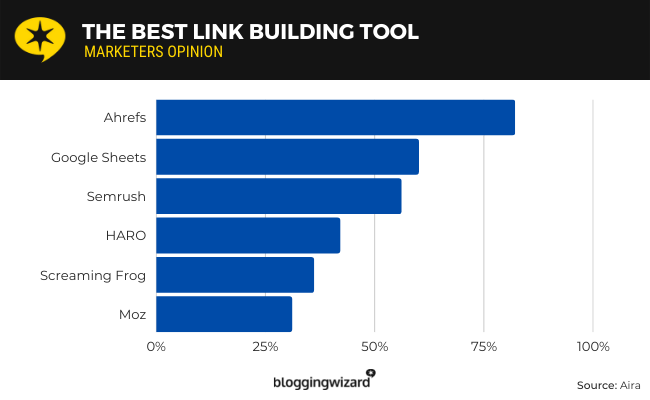
(Aira)
Note: I believe this survey was done before Ahrefs jacked up their prices towards the beginning of 2022 and started charging overages without warning. It’s also worth remembering that the best tool for others may not be the best tool for you. When deciding on a tool, always start with the needs of your business and not someone elses.
How many people use voice search?
Voice search is an emerging SEO trend. Here are some statistics that shed some light on this growing industry:
- 27.5% of the online global population use voice search
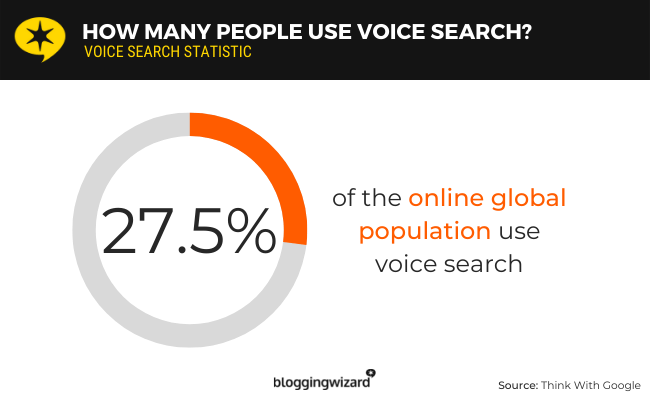
(Think with Google)
- 58.6% of US citizens have used voice search
(Voicebot)
- Voice search is the second most popular mobile search method
(Search Engine Land)
How do I optimize for voice search?
Here are some voice search statistics that can help you to optimize your content for voice search so that you stand the best chance of ranking:
- The average voice search result page loads 52% faster than regular search pages (approx. 4.6 seconds). This suggests page loading speed is an important voice search ranking factor.
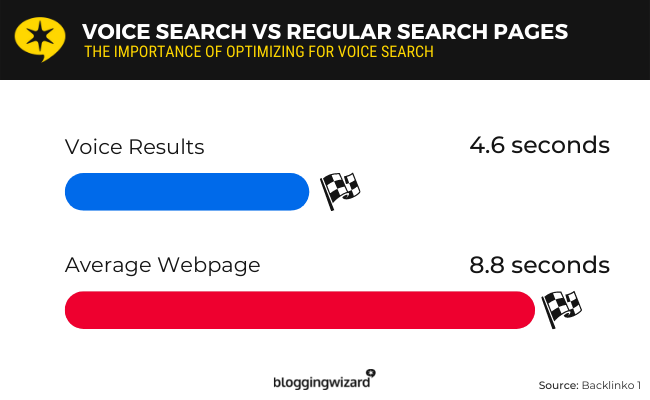
- Pages that rank for voice searches have 44 Tweets and 1200 Facebook shares, on average. This suggests social signals may be an important ranking factor for voice search.
- The average voice search result page has a Domain Rating score of 76.8 (i.e. very high-authority). This suggests website authority may be an important voice search ranking factor.
- Pages that rank for voice searches are 2,312 words long, on average. This is the sweet spot to aim for to maximize your chances of ranking for these types of queries.
(Backlinko1)
SEO statistics sources
SEO statistics: Final thoughts
What can we learn from all of this data? There’s plenty you can use to inform your SEO strategy.
SEO is still as important as ever. And as you probably expected, Google is still the search engine to focus on. But don’t forget Bing – it can still yield some good results.
Most marketers agree that organic search has the best ROI when compared to other marketing channels but it’s difficult to measure. SEO reporting tools can help, however.
That said, attribution is a key challenge shared across all marketing channels.
On-page, user behavior, and the depth/accurate of your content are critical ranking factors but don’t forget about links. Backlinks are still the currency of the web.
Keyword research remains a critical part of the SEO process and can make or break the long-term success of your content. So be sure to inform every article you publish with keyword research. Be strategic with your choices. Focus on uncontested keywords but don’t ignore more competitive keywords.
And be sure to consider other ways to make your content standout. One of the statistics I showed you earlier highlighted that posts with videos get 157% more search traffic, and tend to earn more links.
That concludes our roundup of the latest SEO statistics. If you’d like to dig into more statistics, I’d recommend checking out our roundups on link building statistics, content marketing statistics, and blogging statistics.

